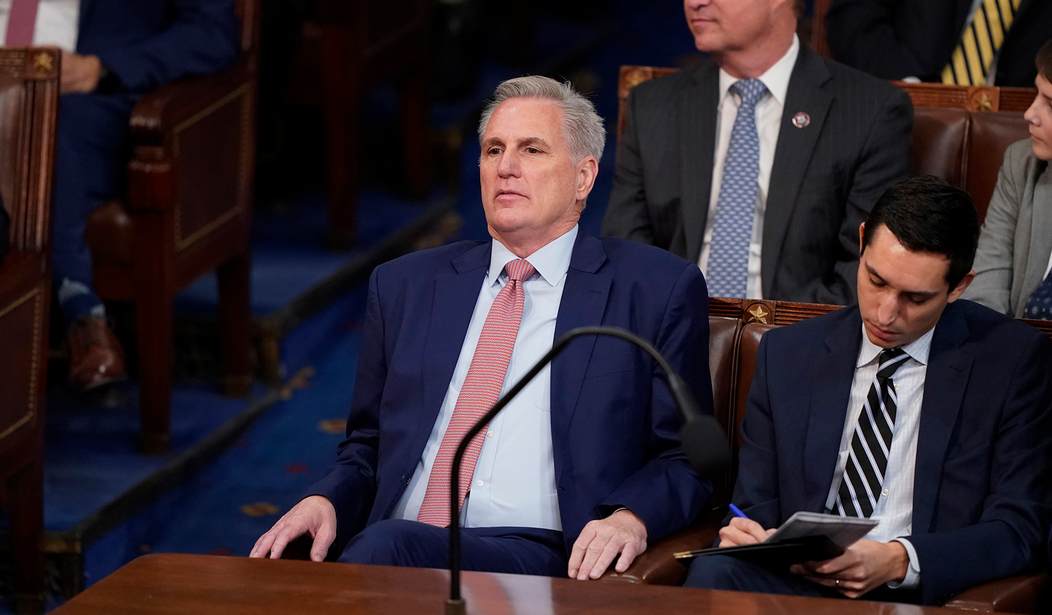If you're looking to get caught up on this Groundhog Day Week of roll call votes, here are Townhall's previous stories on Tuesday's first ballot, the second ballot, the third ballot, Tuesday's fourth and fifth ballots, the sixth ballot, and Thursday's seventh, eighth, ninth, tenth, and eleventh ballots. To put things into perspective, the last time the House had this many failed attempts to elect a speaker was the mid-1800s and the Civil War had not yet occurred. If Republicans wanted to make their new majority historic, they've gotten it — at the expense of not being able to actually start the House's business in the 118th Congress.
To save you time, let's summarize: Kevin McCarthy wants to be Speaker of the House, and he has for a while. He has the support of a clear majority of Republican lawmakers, but due to the GOP's slim majority following the red ripple midterms, those votes don't give him a majority of votes needed in the full House of Representatives to become speaker. There have been around 20 Republicans nominating and voting for other-than-McCarthy individuals including Donald Trump, Byron Donalds, Jim Jordan, Jim Banks, and Kevin Hern. Those 20 holdouts are the reason vote after vote failed to deliver a victory for McCarthy or anyone else.
In the first three days of roll call votes, GOP leadership was successful in seeking adjournment in order to take things out of the public eye and behind closed to doors to try and hammer out a deal to get more votes in McCarthy's column. Those attempts did not work previously, but a House GOP aide told Townhall Friday morning that there still was "no deal" following a GOP Conference meeting, but that the warring factions were "close" to a deal that would push McCarthy across the finish line.
Sure enough, when the house reconvened at noon on Friday there was finally movement in McCarthy's direction as a number of Republicans who had previously voted against him threw their support behind the GOP Leader.
Among them were North Carolina's Dan Bishop, who had not voted for McCarthy on the first 11 ballots this week.
Recommended
🚨@RepDanBishop votes for Kevin McCarthy for the first time. pic.twitter.com/xKzvptLvJk
— Townhall.com (@townhallcom) January 6, 2023
Oklahoma's Josh Brecheen, who had also been a holdout against McCarthy through the first three days of the House's attempt to elect a speaker, flipped and voted for McCarthy citing "transformational rule changes that will give the power to the rank and file."
Rep. Brecheen votes for Kevin McCarthy.
— Townhall.com (@townhallcom) January 6, 2023
"Pending transformational rule changes that will give the power to the rank and file, Kevin McCarthy." pic.twitter.com/cPzGMrMMqP
One of the more notable flips on Friday afternoon — even though he'd supported McCarthy initially — was Byron Donalds. The Florida congressman had stopped voting for McCarthy after the initial ballots and even represented the dissenters for a time as their alternative nominee.
🚨 Rep. @ByronDonalds votes for Kevin McCarthy. pic.twitter.com/daMeS4mMEt
— Townhall.com (@townhallcom) January 6, 2023
In all, thirteen Republicans who had previously been voting to deny McCarthy the speaker's gavel decided to support the GOP Leader on the 12th ballot, while Victoria Spartz of Indiana switched from voting "present" to backing McCarthy again.
Updated: GOP NO votes who are NOW for McCarthy:
— Olivia Beavers (@Olivia_Beavers) January 6, 2023
1. Bishop
2. Brecheen
3. Cloud
4. Clyde
5. Donalds
6. Luna
7. Miller
8. Norman
9. Perry
10. Roy
11. Self
12. Gosar
13. Ogles
*14. Spartz went from present to KM
Despite the flipped votes, McCarthy still did not seal the deal to become speaker on the 12th ballot. the GOP Leader ended the round with 213 votes, Jeffries received his usual 211, Kevin Hern was backed by 3 Republicans, and Jim Jordan got 4 votes. That's the closest McCarthy has gotten to becoming speaker since the 118th Congress met for the first time on Tuesday.
It remains to be seen how McCarthy and his team plan to swing the few remaining votes necessary to hit a majority threshold and whether Republicans will move for another adjournment after the progress made on the 12th ballot or jump right back into a 13th round of voting.
Until next time, here we go again.
UPDATE—
Shortly after the results of the 12th ballot were announced, the House rolled right into its 13th round of voting making McCarthy's quest for the gavel the fifth-longest speaker election in U.S. history. And, yet again, McCarthy came up short of victory — but by just three votes after Andy Harris of Maryland flipped to support McCarthy.
In the end, the 13th ballot ended with 214 votes for McCarthy, 212 for Jeffries, and six for Jim Jordan.
The narrow failure on the 13th voting round means that a 14th ballot will be necessary, but the math is still not in McCarthy's favor at present. There are two McCarthy-supporting members not currently in Washington — Wesley Hunt and Ken Buck, though GOP leadership expects them to return by Friday evening. In the meantime, Republicans will likely move to adjourn until later Friday night to avoid more fruitless ballot rounds.
If those two absent members come back to vote, McCarthy would still be short of the threshold needed to win the speaker's gavel, assuming a full quorum is present. That means McCarthy will need to pick off a few more holdouts from a smaller-than-ever group of dug-in opposition members.
This is a developing story and may be updated.

























Join the conversation as a VIP Member